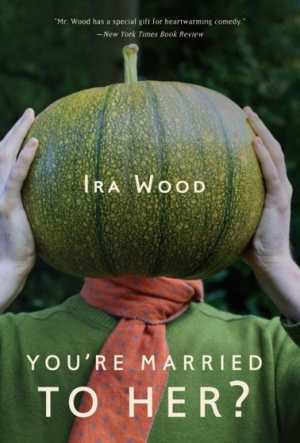Love at First Sight
The Chicken and the Egg

Novelist Ira Wood’s book of essays, You’re Married to Her?, was published by Leapfrog Press. Wood and his wife, Marge Piercy, live on Cape Cod.
How did you meet your wife?
I contrived to meet Marge when my upstairs neighbor announced that a notorious writer friend was coming to visit. Woman on the Edge of Time had just been released, and she was an icon of the New Left. It was the afternoon before the first Passover Seder, and Marge walked in looking like a French movie star. Because I couldn’t imagine what I might say upon being introduced, I interrupted the conversation with an impromptu performance piece, attempting to whip a bowl of egg whites with a wire whisk. Nine out of ten successful women would have written me off as an incompetent schmuck trying to make macaroons; Marge saw a profile from JDate: Twenty-six-year-old Jewish man, curly hair, likes to cook.
How has being married to Marge impacted your own writing?
Marge began as my mentor and became my collaborator. We’ve written three very well-received books together. Early on she was convinced I had what she called “raw talent” and pushed me to keep writing—through endless drafts of an apprentice novel that was never published—and to keep submitting what became my breakthrough comic novel, The Kitchen Man, which was rejected by over thirty mainstream New York publishers until it was accepted by a small press and published to great reviews, a movie option, etc.
What roles do you each play in each other’s work?
We have always read each other’s work in various drafts. Marge finds comments on her early drafts to be helpful while I usually wait until I feel I’ve done as much as I possibly can before I want a second look. Because I’m a writer who tends to second-guess the quality of my work, her opinions have been invaluable (sometimes positive and often not; she’s a brilliant and unsparing critic). We work well together because we’re not competitive. Although it would seem a no-brainer that any two people whose lives are intertwined would root for each other’s individual good fortune, it’s not always the case.
Any advice for young writers?
I tell people to read what they want to write. You don’t become a heart specialist by reading only The Way of the Surgeon and you don’t become a writer by reading how-to books. (And I include our own So You Want to Write in this category.) If you want to write mysteries, read one hundred of them. If you want to write your life story, read the memoirs of the many fine writers who have already done it. Too many young writers know nothing about the craft of writing and find themselves trying to reinvent the wheel. It also helps to appreciate the long, slow, solitary process of writing—and rejection—that it takes to see a book through to publication. If you’re a gregarious person who needs instant feedback and constant contact with people, not to mention a regular paycheck, I can think of more respectable, and lucrative, occupations to pursue.
Do you still think of yourself as an ordinary guy?
As a person prone to swings of emotion, I actually cultivate the state of ordinary-ness. I have a long-standing Zen meditation practice as well as a very practical life partner who encourages me never to take my press—always good and bad in about equal measure—too seriously. Not to sound corny, but I actually find the Tao Te Ching very helpful on this point:
What does it mean that success is as dangerous as failure?
Whether you go up the ladder or down it,
your position is shaky.
When you stand with your two feet on the ground,
you will always keep your balance.
Ira Wood

